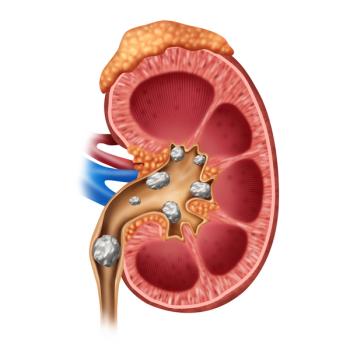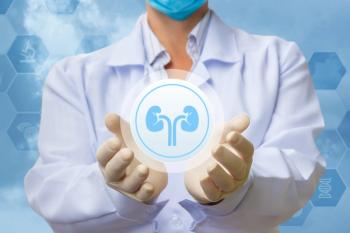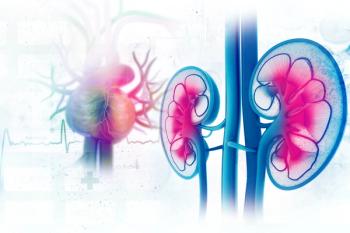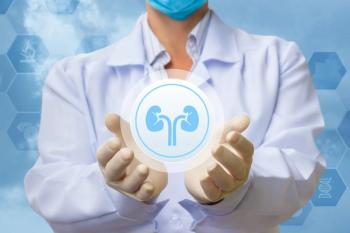
Improved understanding of the early mechanisms of chronic kidney disease (CKD) may be the next step in efforts to delay or reverse disease progression.

Improved understanding of the early mechanisms of chronic kidney disease (CKD) may be the next step in efforts to delay or reverse disease progression.

The study examined the cost to Medicare when patients with end-stage renal disease switched from their employer-based health insurance to Medicare between 2007 and 2017 before the end of the 30-month coordination period.

The study, published on World Kidney Day, is the first to report the optimal amount of activity in patients with chronic kidney disease, according to the authors.

More than a year into the COVID-19 pandemic, a new study suggests that individuals recovering from acute kidney injury stemming from COVID-19 will require kidney monitoring after they leave the hospital.

A retrospective study looking at pediatric patients hospitalized in 4 New York hospitals in 2020 with COVID-19 or multisystem inflammatory syndrome in children (MIS-C) found that acute kidney injury (AKI) occurred in 11.8% of patients.

Despite benefitting from organ transplants similarly to other patients with kidney failure, a new study found patients with kidney failure associated with sickle cell disease (SCD) are less likely to receive transplants.

Cutting-edge genetic tools diagnosed 83% of Irish patients with polycystic kidney disease (PKD), identified 36 novel variants, and discovered that seemingly unrelated individuals with the same variant likely inherited it from a common ancestor.

Adherence to guidelines for slowing chronic kidney disease is low, with substantial variation among the United States and other countries.

Older patients are at greater risk of death in the earliest stages of dialysis, while females possibly are at a higher risk than men, a review of studies found.

Patients with chronic kidney disease (CKD) healthy enough not to have seen a specialist have higher hospitalization rates than the general population, according to a recent study.

Planning and education can help create systemwide change in order to implement greater use of advance care planning and palliative care for those with end-stage renal disease (ESRD).

Brandi Riddle, chief financial officer at Strive Health, discussed the role technology and predictive analytics will play in changing kidney care in the future.

Noting each of their benefits, the researchers also caution that to better characterize their safety and efficacy, there’s a need for further investigation among larger patient pools.

Data from nearly 3000 patients across multiple countries with the disease showed that undertreatment was most notable among patient with hemoglobin (Hb) <10 g/dL.

Nephrologist Mary Dittrich, MD, the chief medical officer and executive vice president of U.S. Renal Care as well as cofounder and partner of Boise Kidney & Hypertension Institute, discusses how to keep patients safe while providing high-quality kidney care during the coronavirus disease 2019 pandemic.

A population-based study from the Netherlands showed that individuals with had at least 1 direct relative affected with chronic kidney disease (CKD), suggesting that biomarkers for CKD can aid in detecting the early stages of the disease.

On this episode of Managed Care Cast, we speak with the new chief financial officer of Strive Health, a value-based kidney care company that works with payers and providers to create an integrated care delivery system for chronic kidney disease and end-stage renal disease (ESRD). We discuss the changes coming to nephrology practices, as well as new ways of looking at the whole patient to halt the slide to irreversible ESRD.

The FDA decision on dapaglifozin for CKD is expected in the second quarter of 2021.

A new study from Sweden cautions against routine discontinuation of renin-angiotensin system (RAS) inhibitors in patients with chronic kidney disease (CKD).

Slowing progression of chronic kidney disease can help mitigate adverse outcomes in minority populations, said Guofen Yan, PhD, associate professor of biostatistics in the Department of Public Health Sciences at the University of Virginia School of Medicine.

This approach allows clinicians to keep using existing prediction models and incorporate chronic kidney disease (CKD) data seamlessly to calibrate patients' risks, said Kunihiro Matsushita, MD, an associate professor in the Department of Epidemiology and Division of Cardiology at Johns Hopkins University.

Two story lines predominated renal news in 2020: coronavirus disease 2019's effect on the kidneys and the overwhelming benefits of sodium-glucose cotransporter 2 inhibitors for those with chronic kidney disease and type 2 diabetes.

The author discusses how value-based payment models in chronic kidney disease can improve total cost and quality of care for patienst with chronic kidney disease (CKD).

A study evaluating whether a virtual platform can improve access to evaluations for kidney transplants found that surgical teams could continue to keep up with evaluations adding patients to wait lists during the pandemic.

Bringing together genetic work with social determinants of health can improve understanding of factors associated with ESKD disparities, said Adriana Hung, MD, MPH, associate professor of medicine at Vanderbilt University, and Bryce Rowan, a statistical genetic analyst.

259 Prospect Plains Rd, Bldg H
Cranbury, NJ 08512
© 2025 MJH Life Sciences®
All rights reserved.
